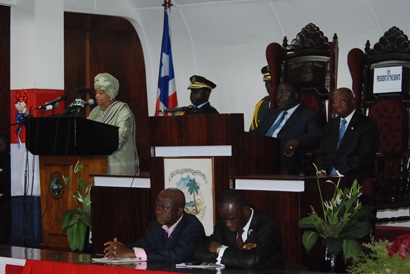Sirleaf to Seek Second Term

First elected after a powerful women’s peace movement forced the end of years of brutal civil war in Liberia, President Ellen Johnson Sirleaf is asking for a second term to continue with the enormous challenge of rebuilding her country.
Liberian President Ellen Johnson Sirleaf surprised and even angered some Liberians recently when she announced that she would run for a second term in office in 2011, after saying she wouldn’t during her campaign in 2005. Yet with so much left to do to repair Liberia after a devastating 14-year civil war, her choice to try to fulfill her myriad campaign promises—rather than leave office and risk the country falling backwards—makes sense.
Opposition candidates are using her announcement as an opportunity to ramp up their attacks. They ignore such accomplishments as her work tackling rape and gender inequalities, deeply entrenched in Liberian society, which have won her international backing. Secretary of State Hillary Clinton and American Ambassador to Liberia Linda Thomas Greenfield have come out in support of her bid for re-election.
In the last four years, Sirleaf established a special rape court for victims of gender-based violence, passed the 2006 Rape Amendment Act imposing stricter penalties and denying bail for the worst violations, and created special women and children protection units within communities. To implement the UN’s call to include women in post conflict reconstruction (Security Council Resolution 1325), she created a national action plan to strengthen local women’s groups and train women to detect outbreaks of violence before they happen. Speculation over Sirleaf’s re-election plans had been heating up for months, fueled by the July release of a draft final report from the national Truth and Reconciliation Commission. It recommended that the “Iron Lady” be banned from office for 30 years for her support of former-president and warlord Charles Taylor. Sirleaf admitted giving Taylor contributions but has said she didn’t realize his intentions when she supported him.
While the international community has showered Sirleaf with awards and aid since she was inaugurated in January of 2006, many young unemployed Liberians and those living in rural areas demand more immediate and widespread change. Some suggest that she emulate the leadership and dignity of South African President Nelson Mandela, who did not seek a second term.
I interviewed Sirleaf last spring, when she was in New York promoting her memoir This Child Will Be Great. I asked then whether she would seek re-election, and her answer was telling. She didn’t want to think about her own future plans. “That’s the question I don’t answer yet. So I don’t get distracted,” Sirleaf said. “I told everyone I’d tell them next year. For now I want to stay focused on carrying on development.”
Then in her State of the Union address on January 25, 2010, Sirleaf finally broke her silence and announced her plan to run. First she spoke of how far the country has come from its state before she took office, when Liberia “was little more than a shell, devastated by war, an economy in ruins, lacking any real physical infrastructure, an international pariah and inhabited by a people worn down by decades of conflict.” She said she always knew it would be hard to transform the country fully in one six-year term, that there was no “magic wand” or “quick fix.” Instead, “development is, by definition and practice, a slow and continuing process.”
Sirleaf and her supporters believe she is the leader best equipped to continue the work ahead. “I know from whence we came yesterday. I know where we are today; I know where we ought to be tomorrow and I know how we will get there,” she said. “Therefore, however I act, whatever I do, it will be for you. And so it is for these reasons and to bring to an end all speculations, that I now announce to you and to the thousands of supporters in radio land and abroad that I will be a candidate, a formidable candidate, in the 2011 elections.”
Opposition candidates were ready to pounce. Charles Brumskine of the Liberty Party, who came in third in the 2005 election, has played down Sirleaf’s accomplishments, saying that “85 percent of the population is still unemployed and four out of every five Liberians cannot find one dollar a day on which to live. For the ordinary Liberian, not much has changed. In fact, life has gotten harder.” He also told the BBC's Network Africa program he was concerned about her age, that the 73-year old was “new wine in old bottles.”
Whether Sirleaf’s bottles are old or new, they seem shatterproof. She has lived a remarkable life. From her days as a victim of spousal abuse, to her time in jail, to surviving several attempts on her life, to her election as Africa's first female leader, she has not given up. And I don’t expect her to walk away from her feeling of responsibility to her country. She told me in New York that Liberia had made a lot of progress in the first half of her term. “And if in the next three years we continue this progress then we’ll be on an irreversible path.” Until Sirleaf believes she is leaving Liberia in a good place, and in good hands, she will not turn her back. And she shouldn’t.
More articles by Category: International, Politics
More articles by Tag:



























